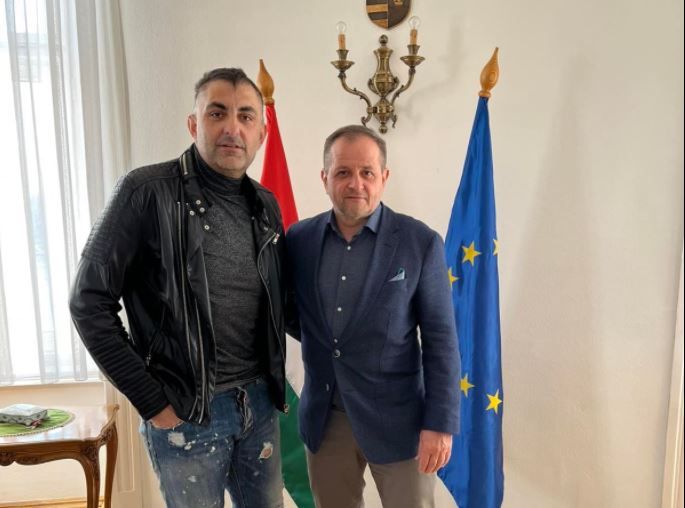
Győzike published several photos depicting him and Budai in the Foreign Ministry signing a document.Continue reading

From meeting up with celebrities and reality TV stars to making representation a part of the party list, both Fidesz and the United for Hungary opposition alliance have been campaigning to Roma voters with different means. Roma are the largest minority in Hungary, making up 7-10 percent of the population. Given the potential impact they could have on the election, it comes as no surprise that parties have not hesitated to reach out to them.
Fidesz has very clearly made a point of supporting Hungary’s Roma minority and campaigning towards them directly. Even before the campaigning period began, Prime Minister Viktor Orbán posted a video declaring the Fidesz slogan of “The tomato was red not yellow. Hungary is going forward not backward. (Piros volt a paradicsom nem sárga, Magyarország előre megy nem hátra.)” The video, posted at New Year’s Eve, featured a reproduction of the slogan in the style of a catchy Roma folk-pop song, which can be heard over clips of Orbán meeting his supporters.
When the House of Hungarian Music was inaugurated in January, renowned musician Béla Szakcsi Lakatos played the slogan following his performance in the concert hall. The performer later also voiced his support for Fidesz.
More recently, Viktor Orbán posted a video on Thursday receiving Kis Grófo, a pop singer and one of Hungary’s most well-known Roma celebrities, at the Carmelite Monastery, the Prime Minister’s Office. In the video, edited together with some of Kis Grófo’s popular hits, the celebrity meets up with the Hungarian prime minister and they have a conversation on the huge terrace overlooking the capital. At the end of the video, Kis Grófo concludes by saying that “we” support the prime minister, most likely referring to the entire Roma community.
We really like Mister Prime Minister. Only you, only Fidesz, I’m saying this with complete honestly. Even before this we were [Fidesz voters], but now I said that now is the time to take up the responsibility and […] clearly sate that yes, only Fidesz! We are Fidesz voters.”
Another highly popular Roma celebrity and reality show star Győző Gáspár, known as Győzike, also voiced his support for the governing party. On Tuesday, Győzike published photos of himself being endorsed for party membership by Fidesz representative Gyula Budai. Győzike also took part in the pro-Fidesz “peace march” which took place on March 15.
The United for Hungary alliance of the opposition has also been campaigning to Roma voters, and has made Roma representation part of its platform. The allience published its joint list with its leader, Péter Márki-Zay, requiring that the six parties name at least three Roma candidates with a “guaranteed” place in the next Parliament. In the end, Jobbik, Momentum, and Párbeszéd each gave one of their more prestigious places on the list to Roma candidates.
These three candidates are Sándor Berki, Lajos Lőcsei, and Ferenc Varga.
Several public figures from the Roma community have also voiced their support for the opposition. János Agócs, President of the National Roma Council (ORÖ), said that over the last 12 years, Hungary’s Roma population has not experienced a significant enough level of development. He hopes that a government led by the current opposition would prove otherwise.
Agócs, two of ORÖ’s vice presidents, and multiple other Roma politicians have signed an announcement calling to the Roma community to vote for the united opposition. The announcement states that the Orbán government has proved that the bottom third of Hungary’s population is destined for slavery, shame, and misery. It calls for the “national theft system,” to be replaced by the “national ascension system.”
The announcement also raises some of the opposition platform’s points, such as the establishment of a State Secretariat for Roma Affairs, the extension of family benefits, support for Roma religious congregations and small churches, the development of education and health care, and the “actual implementation” of infrastructural developments.
It has become widely known that the vast majority of Roma voters support Fidesz. Agócs noted that around 90 percent of Hungary’s eligible Roma population voted for Fidesz in the last two elections.
It is estimated that there are around 700,000 Roma living in Hungary, roughly 7 percent of the population, the majority of whom live in the north-easternmost and south-westernmost regions of the country.
For this reason, it should come as no surprise that most Roma are Fidesz voters. Earlier in the 2000s, it was assumed that most Roma voted for Ferenc Gyurcsány’s MSZP (one of the ruling parties at the time), but trends have changed over time to show a clear favoring for the current governing party.
Both in 2014 and 2018, Budapest was a microcosm of votes compared to the rest of the country. Fidesz had a disproportionately lower number of votes relative to opposition parties, especially the Democratic Coalition and the Socialists, but has been the party of choice in most other regions of Hungary, both in villages and cities.
Thus, despite Budapest having the highest concentration of Hungarian voters, the location of votes in Hungary matters, and one of the greatest challenges of the opposition has been branching out to the countryside.
Regions of Hungary with large Roma populations are also some of the least developed parts of the country. Thus it is not just ethnicity, but socioeconomic status which must be considered. It has been found that poorer regions are significantly more likely to vote for Fidesz, a trend which has been increasing over time.
G7 reported that in the 2018 elections, Fidesz won an overwhelming majority in all 10 of the poorest settlements in Hungary.
It is argued that one of the determining factors of why poorer areas vote overwhelmingly for Fidesz is public works. These poorer villages do not have the same access to jobs and education as more developed parts of Hungary, thus they are dependent on financial support from the government. In 2011, the Orbán government introduced its concept of a “work-based society” and removed these forms of passive income replacing them with public work opportunities. These new job opportunities pay twice as much as previous state aid, thus the heightened support of many Roma populations can be attributed to their improved economic situations. But in deprived regions, anyone who, for whatever reason, does not become a public worker is left without a source of livelihood.
However, under the Orbán government, the poorest 10 percent of wage earners faired the most poorly, having remained at the same income level since 2010. Not only that, but more people have lost their state funding than the number of people working in public works.
According to government-critical Telex, a large number of people working in public works are dependent on Fidesz for their employment, thus they have no choice but to vote for the Fidesz mayors and Fidesz representatives who gave them jobs. After all, it is government institutions who decide how many workers there can be in public works for each settlement, and it is local mayors who decide who gets the job and who doesn’t.
In the featured photo: Prime Minister Viktor Orbán with Roma pop star Kis Grófo. Photo via Viktor Orbán’s Facebook page